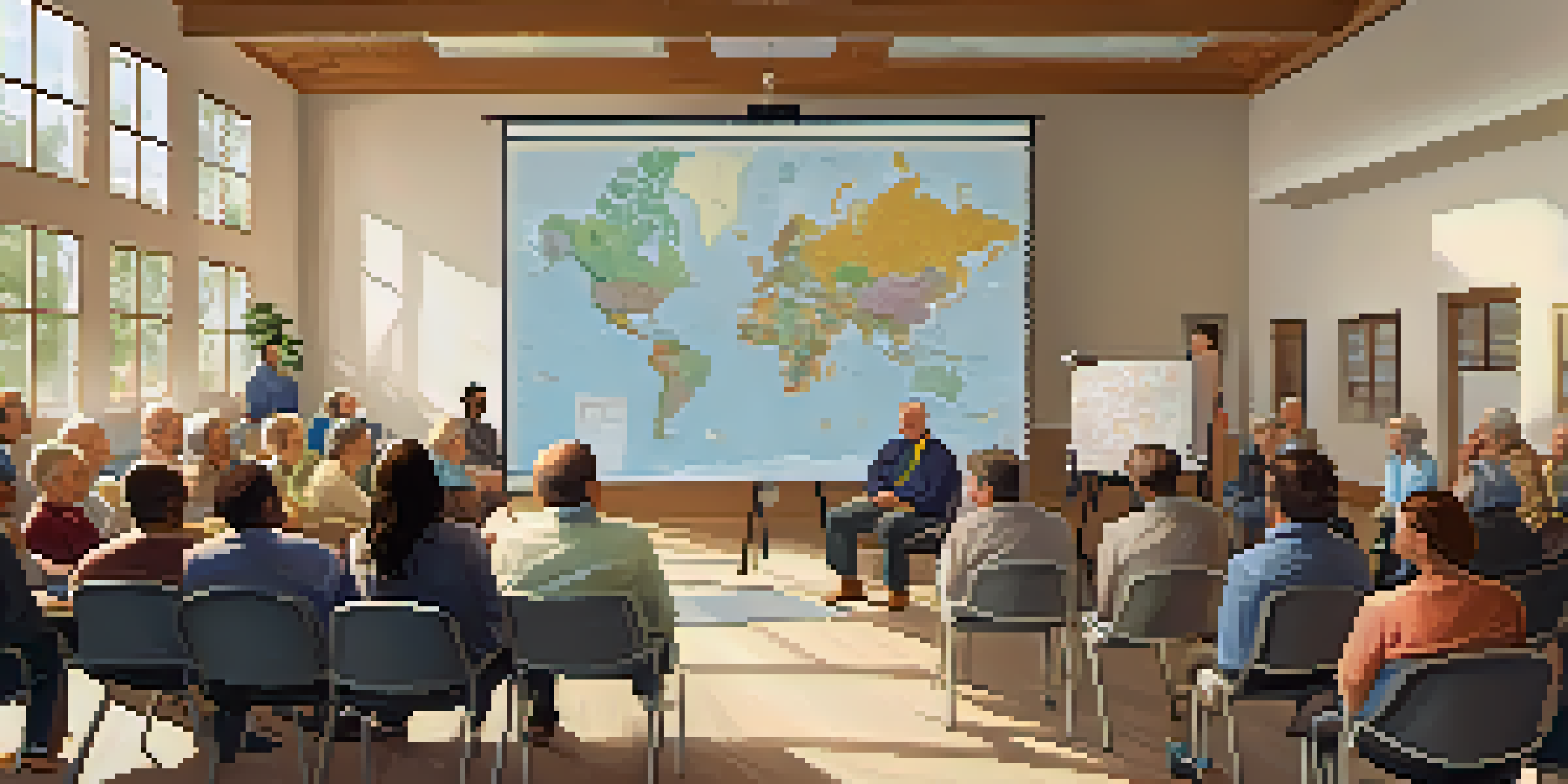The Role of Local Government in Utah's Political Framework

Introduction to Utah's Local Government Structure
Utah's local government plays a crucial role in its political framework, serving as the foundation for community engagement and public services. The state is divided into counties, municipalities, and special districts, each with distinct responsibilities and powers. Understanding how these entities interact provides insight into the broader political landscape of Utah, making it easier for residents to engage with their local governance.
The best way to predict the future is to create it.
Counties in Utah are responsible for providing essential services such as law enforcement, public health, and road maintenance. Municipalities, on the other hand, focus on local issues like zoning, parks, and public utilities. Special districts address specific needs like water management and public transportation, ensuring that various community needs are met efficiently.
This layered approach to governance allows for more localized decision-making, which can be more responsive to the unique needs of different communities. By breaking down the responsibilities among various levels, Utah promotes civic involvement and ensures that residents have a voice in their local government.
The Power of Local Elections in Utah
Local elections in Utah are pivotal as they determine who will represent communities at the county and city levels. Voter turnout in these elections often reflects community engagement and awareness of local issues. This participation is essential in shaping policies that directly affect residents' daily lives, from education to infrastructure.

Candidates for local offices, such as mayors and council members, often focus on specific community issues that resonate with voters. This localized approach contrasts with broader state and federal elections, where candidates may address more general issues. Such focus helps to create a stronger connection between elected officials and their constituents.
Local Governance Enhances Community Life
Utah's local governments are essential for providing vital services and fostering community engagement, ensuring that residents have a voice in decision-making.
Moreover, local elections are typically non-partisan, allowing candidates to prioritize community needs over political affiliations. This aspect encourages diverse perspectives and fosters collaboration among community members, ultimately leading to more effective governance.
Local Governments and Community Services
Local governments in Utah are tasked with providing essential services that directly impact the quality of life for residents. From maintaining public parks to ensuring clean water supply, these services are vital for the health and well-being of communities. Local leaders prioritize these needs, often based on direct feedback from their constituents.
Local government is the government closest to the people, and that’s where it all begins.
Additionally, local governments manage public safety services, including fire departments and emergency medical services. These services not only protect residents but also foster a sense of security and community trust. By investing in these areas, local governments build stronger relationships with residents, encouraging them to engage more actively in community affairs.
Furthermore, local governments often collaborate with non-profits and community organizations to enhance service delivery. This partnership approach helps to meet diverse needs and ensures that resources are used effectively, creating a more resilient community framework.
The Role of Local Government in Economic Development
Local governments in Utah play a significant role in fostering economic development within their communities. By creating favorable business environments, they attract new businesses and support existing ones. Local officials often develop incentives, such as tax breaks and grants, to encourage entrepreneurship and job creation.
Moreover, local governments facilitate infrastructure development, which is crucial for economic growth. Investments in roads, public transportation, and utilities not only enhance the quality of life but also make areas more appealing to businesses. Such infrastructure improvements can lead to increased property values and higher tax revenues, benefiting the community as a whole.
Economic Development Through Local Efforts
Local governments play a crucial role in economic development by creating favorable conditions for businesses and investing in infrastructure.
Additionally, local governments often engage in workforce development initiatives. By collaborating with educational institutions and training programs, they ensure that residents have the necessary skills to thrive in a changing job market. This proactive approach to economic development helps create a sustainable local economy.
Community Engagement and Local Governance
Community engagement is a cornerstone of effective local governance in Utah. Local governments actively seek input from residents through public meetings, surveys, and forums, encouraging participation in decision-making processes. This involvement fosters transparency and builds trust between officials and constituents.
Moreover, local governments often implement programs that promote civic engagement, such as youth councils and community advisory boards. These initiatives provide platforms for residents to voice their opinions and contribute to local governance. By involving diverse community members, local governments can better understand the needs and concerns of all residents.
Engaged communities are more likely to collaborate with local governments on initiatives that enhance quality of life. This partnership not only leads to more effective policies but also strengthens the sense of community, creating a shared responsibility for local governance.
Challenges Facing Local Governments in Utah
Despite their importance, local governments in Utah face several challenges that can hinder effective governance. One major issue is budget constraints, which limit the resources available for essential services and infrastructure projects. As communities grow, the demand for services increases, often outpacing available funding.
Additionally, local governments must navigate complex regulatory frameworks and state mandates. Balancing local priorities with state requirements can be challenging, leading to tensions between different levels of government. Local leaders often have to advocate for their communities at the state level to ensure their needs are met.
Challenges and Future of Local Government
Despite facing budget constraints and regulatory challenges, the future of local government in Utah hinges on adaptability and community collaboration.
Moreover, addressing issues such as housing affordability and environmental sustainability requires innovative solutions and collaboration with various stakeholders. Local governments may struggle to find the right balance between development and preserving community character, making it essential for them to engage residents in these critical discussions.
The Future of Local Government in Utah
Looking ahead, the role of local government in Utah is poised to evolve in response to changing demographics and technological advancements. As communities become more diverse, local governments will need to adapt their services and engagement strategies to meet the needs of all residents. This adaptability will be crucial in maintaining effective governance.
Technology also offers new opportunities for local governments to enhance transparency and engagement. Digital platforms for public feedback and online access to government services can streamline processes and foster greater community involvement. Embracing these tools can help local governments connect with residents in more meaningful ways.

Ultimately, the success of local government in Utah will depend on its ability to foster collaboration and inclusivity. By prioritizing community engagement and adapting to changing needs, local governments can continue to play a vital role in shaping the future of their communities.